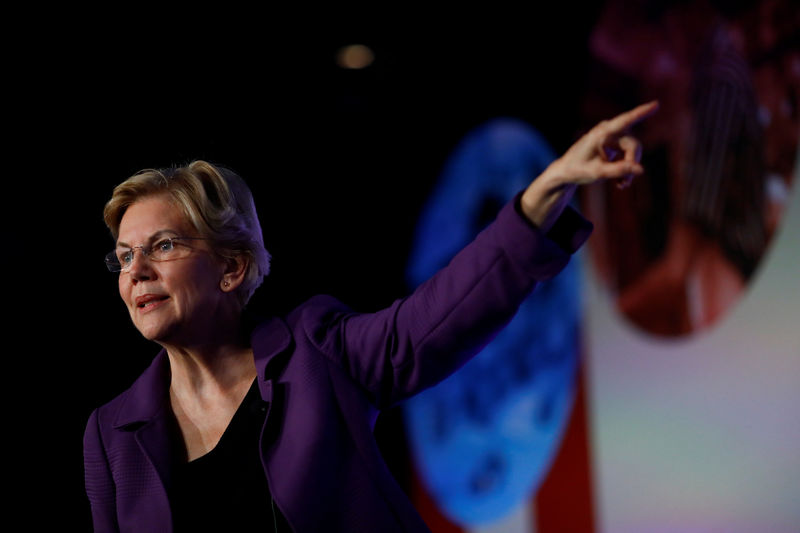By Elizabeth Culliford
(Reuters) - U.S. Democratic presidential candidate Elizabeth Warren took aim at Facebook's political advertising policies on Monday, suggesting without evidence that a change in the social media giant's policy might have been linked to a recent meeting between Facebook CEO Mark Zuckerberg and President Donald Trump.
Facebook, which has been under scrutiny from regulators after U.S. intelligence agencies found that Russia used social media platforms to interfere in the 2016 presidential election, recently changed the wording of its rules on political ads, which used to ban "deceptive, false or misleading content."
Its new online policy prohibits "ads that include claims debunked by third-party fact checkers or, in certain circumstances, claims debunked by organizations with particular expertise," but this has led some to point out that politicians' ads and posts are exempt from Facebook's fact-checking program.
Warren, a Democratic frontrunner who in March called for breaking up Amazon.com Inc (NASDAQ:AMZN), Alphabet (NASDAQ:GOOGL) Inc and Facebook Inc (NASDAQ:FB), argued in her tweets that the public needs to know how Facebook intends to use its influence in the November 2020 presidential election.
“For instance, Trump and Zuckerberg met at the White House two weeks ago. What did they talk about?” she tweeted, referring to a Sept. 19 meeting.
"After that meeting, Facebook quietly changed its policies on 'misinformation' in ads," she asked. "Put another way, Facebook is now okay with running political ads with known lies," she added.
A Facebook spokeswoman said the update to its external ad policy page had not changed its policy or enforcement.
The Warren campaign and Trump campaign did not immediately respond to requests for comment.
Using an example of a Trump campaign Facebook ad that said Democrats wanted to repeal the Second Amendment, Warren argued that Facebook was allowing Trump to mislead the public.
FactCheck.org director Eugene Kiely, whose organization is one of Facebook's independent fact-checking partners and which has called Trump's Second Amendment ads "deceptive," said he thinks Facebook users should see related fact-checking stories next to political ads.
In her Monday tweets, Warren also referenced leaked audio of an internal Facebook Q&A session in which Zuckerberg talked about what a Warren presidency could mean for the company.
She said Facebook was "taking deliberate steps to help one candidate intentionally mislead the American people, while painting the candidacy of others (specifically: mine) as an 'existential' threat."

Trump has frequently criticized social media platforms for alleged bias against conservatives, a claim the companies deny.